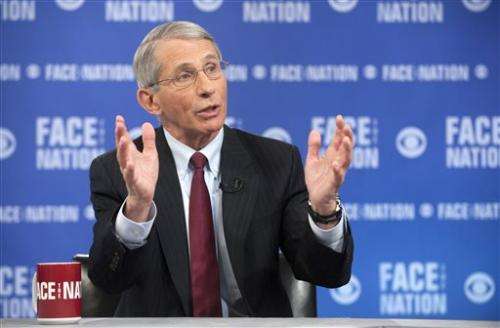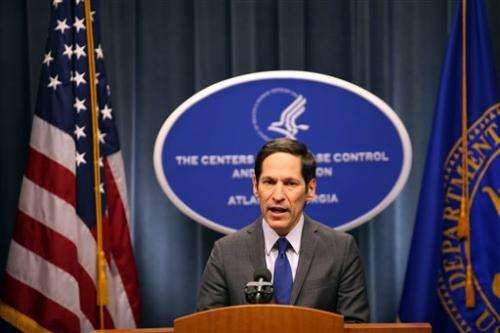More Ebola screening possible for United States

Federal health officials said Monday the U.S. is weighing whether to institute extra screening at U.S. airports where travelers from Ebola-stricken African nations may be arriving, ahead of a White House meeting on the Ebola outbreak.
Dr. Anthony Fauci, director of the National Institute of Allergy and Infectious Diseases, said "discussion is underway right now" and "all options are being looked at." The question, Fauci told CNN, is whether "the extra level of screening is going to be worth the resources you need to put into it."
"There is clear-cut screening going on in the exit end," Fauci said, referring to the Ebola-affected countries' practice of screening outbound passengers before they leave. The current U.S. discussion, he said, centers on "what kind of screening you do on the entry end. That's something that's on the table now."
The Ebola outbreak is believed to have killed more than 3,400 people in West Africa and has taken the biggest toll in Liberia.
Dr. Tom Frieden of the Centers for Disease Control and Prevention, said officials are looking at all options "to see what we can do to increase safety of all Americans." Extra screening might include checking travelers to see if they have a fever, then evaluating them further if they do, he said. He said about 40,000 people had come in to the U.S. from African countries over the past six months, including Americans returning from travels there.
President Barack Obama is scheduled to get an update on Ebola outbreak Monday afternoon from his national security team and other senior officials.
The Obama administration has said that it won't shut down flights from affected countries, particularly those in West Africa. Fauci reiterated that such a travel ban could end up spreading the epidemic in those countries, making it harder to get aid in, for instance, and further isolating those nations.
Addressing the White House meeting, Frieden told "CBS This Morning," ''We're going to be covering many aspects and figure out what we can do" to protect Americans and stop the outbreaks. He added that he was encouraged by ongoing vaccine trials.
Fauci noted that the supply of the experimental drug known as ZMapp, which may have helped American health workers who caught Ebola while working in Liberia, is gone. He said federal officials were helping the drug manufacturer with efforts to boost manufacturing, but that it would be up to two months before any more of the drug is available. Moreover, tests on potential vaccines or treatment drugs need to be done to prove that a drug works.

Frieden said he doesn't believe the disease is going to spread widely in the United States.
The Ebola outbreak is believed to have killed more than 3,400 people in West Africa and has taken the biggest toll in Liberia. There aren't enough beds in isolation units to keep up with the hundreds who get sick each week.
The U.S. military is beginning work in the Liberian capital Monrovia on the main structure of the 25-bed clinic that will treat health care workers infected with Ebola. The U.S. has also promised to build 17 other Ebola treatment centers, which would have space for 100 patients each.
Also Monday, an American photojournalist who contracted Ebola while working in Liberia is expected to arrive in Nebraska, where he will be treated for the virus that has ravaged West Africa.
Ashoka Mukpo, 33, will be the second Ebola patient to be treated at the Nebraska Medical Center's specialized isolation unit. Mukpo was working in Liberia as a freelance cameraman for NBC News when he became ill last week.
NBC reported that the specially-equipped plane carrying Mukpo landed early Monday in Maine to refuel before it makes the final leg of its journey to Omaha, where his family said he would be treated. Taylor Wilson, a spokesman for the medical center, said the plane carrying the Ebola patient was expected to land at Eppley Airfield, just outside of Omaha, at 7:45 a.m. (1245 GMT).
Mukpo is the fifth American to return to the United States for treatment since the start of the latest Ebola outbreak, which the World Health Organization estimates has killed more than 3,400 people. Meanwhile, a Liberian man with Ebola who started showing symptoms while visiting the U.S. is in critical condition at a Dallas hospital.
The Nebraska hospital's biocontainment unit was created in 2005 specifically to handle this kind of illness, said Dr. Phil Smith, who oversees the unit.
Doctors at the isolation unit—the largest of four in the U.S.—will evaluate Mukpo before determining how to treat him. They said they will apply the lessons learned while treating American aid worker Rick Sacra in September. Sacra was successfully treated in the Nebraska unit and was allowed to return to his home in Massachusetts after three weeks, on Sept. 25.
Sacra received an experimental Tekmira Pharmaceuticals drug called TKM-Ebola, as well as two blood transfusions from another American aid worker who recovered from Ebola at an Atlanta hospital. The transfusions are believed to help a patient fight off the virus because the survivor's blood carries antibodies for the disease. Sacra also received supportive care, including IV fluids and aggressive electrolyte management.
In Dallas, another man who recently traveled to the U.S. from Liberia was listed in critical condition Sunday. Thomas Eric Duncan has been hospitalized at Texas Health Presbyterian Hospital since Sept. 28. Dr. Tom Frieden, director of the federal Centers for Disease Control and Prevention, said he was aware that Duncan's health had "taken a turn for the worse," but he declined to describe Duncan's condition further.
The virus that causes Ebola is not airborne and can only be spread through direct contact with the bodily fluids—blood, sweat, vomit, feces, urine, saliva or semen—of an infected person who is showing symptoms.
Duncan arrived in Dallas on Sept. 20 and fell ill a few days later. Officials say 10 people definitely had close contact with Duncan and a further 38 may have been around him when he was showing symptoms of the disease.
Before he was admitted to the hospital, Duncan stayed with Louise Troh, her 13-year-old son and two nephews in their northeast Dallas apartment. The family has been kept in isolation in an undisclosed location since Friday and a hazardous materials crew has twice decontaminated their home. No one in the family has developed Ebola symptoms.
© 2014 The Associated Press. All rights reserved.

















